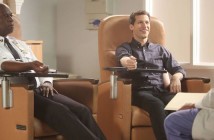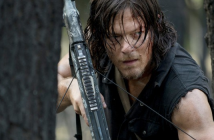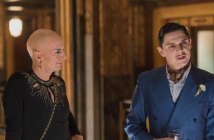March 9, 2014, 9:00 pm (EST), HBO
Let’s talk about endings. There is a tendency, I think, in our evaluation of all art, to over-value its conclusion. This is especially the case in long-form storytelling like television, where that ending is often years in the making. A show like The Sopranos is lauded as a high-water mark for the medium, and yet by far the most discussed aspect of the series is its ambiguous final scene. The critical reputation of Breaking Bad has yet to settle, but when it does, I would not be surprised to find it is somewhat lessened by an underwhelming finale (if the show had ended with “Ozymandias,” the exact opposite might be the case). There is an argument to be made that endings should be less emphasized, seen as no more essential than any other aspect of the series. In fact, the more stories you hear in your life, the more art you consume, the more likely you are to anticipate and ending or to develop expectations that will not or cannot be met.
Yet I am not here to make that argument. An ending is a capstone, the final chance for a creator to impart the message of their story, and it is vital to interpreting the meaning of all that has come before. Especially in a show as nakedly philosophical as True Detective, the ending is an affirmation or a definition of an entire worldview, a way to cosmically underline the themes of the piece. Doing a one-and-done, anthology-style series gives creator Nic Pizzolatto freedom to do pretty much whatever he wants. I doubted “Form and Void” would give way to the supernatural as some suspected, but it could have. The show could easily have ended in bleak Lovecraftian (or perhaps more aptly Chambers-esque) fashion, or it could have revealed the whole thing to be a nightmare in the mind of Rustin Cohle, who would wake up fresh faced and young to his baby daughter waiting in the other room.
Before talking about the ending it chose, I want to offer up some thoughts on this season of television as a whole. True Detective has been a very good show that often flirted with greatness, but not one without its problems. Its treatment of women has been often (and rightly) decried, and any eight hour series that fails to pass the Bechdel test (I have no evidence to back this up, but if my memory serves, this season did not pass) or to give Michelle Monaghan anything more interesting to do than fret about Woody Harrelson and vaguely pine after Matthew McConaughey has some serious work to do. My fervent hope is that Pizzolatto, who seems to see the issue, has plans to overhaul this aspect of the series going into season two, but for the moment, it stands as a marker of a big problem for this story.
The show also exhibited some plotting issues, most easily resolved by the concession that True Detective isn’t about the mystery so much as it is about the men solving it. I actually buy this, and frankly don’t mind the show using mystery as a MacGuffin for character work, but this season’s actual plotting has been a little messy and overly conventional. Ultimately, when I think on this series, I see it as the most ambitious and most successful of the recent rash of pseudo-prestige dramas that have traded on an air of sophistication instead of actually finding it. True Detective uses philosophy, literary allusions, and top-notch performances to paper over some fairly conventional story beats and character arcs that could honestly have used a bit more depth or breadth. I wouldn’t go so far to call this season a shell game, because I think it has been consistently very solid with some missteps, but it basically slapped a very good paintjob on a crumbling façade and called it a day. This show is no Low Winter Sun, by any means, but it may be closer to that than to the aforementioned masterpieces of television. Again, if it sounds like I am damning True Detective with faint praise, it is not because I don’t think this is a very solid season of TV (if forced, I think I would give it a B+ overall, though I could be persuaded to trend higher), simply because I see room for improvement going forward. If nothing else, this series is one of several in the last year (including Top of the Lake and Broadchurch) to remind me of the endless vitality of the murder-mystery format to tell a story, and it has made and won the argument that television needs an anthology series like this one.
Now, to “Form and Void,” which ends our story of Rustin Cohle and Marty Hart by reminding us that despite all our petty concerns and preoccupations, we exist in a world of light and dark. For most of its run, True Detective has felt like the most nihilistic thing on television, a relentlessly bleak examination of a haunted world on the brink of dissolution and a dark detective who had glimpsed the void and couldn’t blink his way back to the light. Yet “Form and Void” ends with a note of optimism from its most pessimistic (or, as he would call it, pragmatic) character, a hint that there is always another side to the coin. Throughout this season, I have consistently thought Rust’s diatribe’s were darkly compelling but ultimately limited. Call it naïve, but for every one of his dark proclamations there is a lighter side he was overlooking in his myopia. For his bleakest nihilism, there is a more hopeful existentialism lying just out of view. Rust Cohle has earned every drip of his darkness through an almost comically awful series of traumas, but after seventeen years chasing a monster down a black hole of human depravity, “Form and Void” finds him lying on the ground in “Carcosa,” looking up, and seeing the light.
After his long, wonderful, immediately classic speech where he declared “time is a flat circle” (this remains the thing I will remember most about this season of television, and comes from its best episode, “The Secret Fate of All Life”), this finale finds Rust talking about how everyone has a choice. It isn’t that he has suddenly become an optimist; in fact, I would argue a lot of this talk is the rationalization of a man who assumes he may soon be dead and wants to enact some change for the better on the way out the door. But Rust sees in his sea of nihilism some rays of hope. He may be retreating from the idea that human consciousness is an evolutionary aberration that deserves to be snuffed out; not necessarily because he sees this as wrong, but because he understands that, mistake or no, its existence is miraculous, and miracles tend to be worth celebrating.
Errol William Childress takes center stage tonight as we finally see The Yellow King lording over his kingdom. At first glance, Childress is underwhelming, with his shifting accents and spooky whistle. Though Glenn Fleshler is terrific in the role, he was almost bound to be a disappointment after a season building up the gothic mythos surrounding The Yellow King. But by the time Marty is rushing to clear his dilapidated house while Rust follows him into a maze of Devil Catchers with the Devil himself whispering in his ear, this has turned into the walking nightmare we always new was this story’s ultimate conclusion. We were told there was a monster at the end of this dream, and “Form and Void” does not disappoint in that regard.
In the end, this season’s legacy may be the way it afflicted so many of us with the Detective’s Curse, forcing fans to dig into abstract theories and minutiae in search of clues to lead them to The Yellow King when that was really just a misdirect for a story about two lost men finding their way out of the darkness with each other’s help. The two have hated and tolerated each other for nearly twenty years, but in the episode’s final act, they develop the sort of gruff, buddy cop repartee that exemplifies their rough hewn, old school masculinity and approximates affection the best way they know how. Rust and Marty will never be best friends, because neither of them is really the type of person who can have a best friend. They don’t let people close enough. But, as pretentious as it sounds, they have seen each others’ truths, and they have come to understand each other enough to live in the world together. It is incredibly moving to watch, especially in that tour de force final scene in the hospital parking lot (honestly, both McConaughey and Harrelson should submit “Form and Void,” even though it is not my favorite episode, for Emmy consideration).
Because of their jobs, but even more fundamentally because of the way they have chosen to live in the world, Rust and Marty have come to see the darkness as all-consuming. They look out their windows, and they see the wasteland they have patrolled for decades stretching out before them as the deeply unsettling setting for cosmic horrors they not only have to imagine, but are forced to witness firsthand. Its easy to look into the sky after years of this and see only the darkness. But after years living that way, Rustin Cohle is making some changes in his perspective. There used to only be darkness, but whether through chance or purpose, whether through a mistake, a miracle, or both, somehow, now, there is light.
The Roundup
- - “It’s been weeks since I left my mark. Would that they had eyes to see…”
- -“I just…follow what the big man says. That’s how this works.”
- -“It’s chain of command…right?”
- -“I strike you as more of a talker or a doer, Steve?”
- -“Everybody’s got a choice, Marty.”
- -“I didn’t want to invite judgments. You never liked being judged.”
- -“Everybody judges, all the time. Now, if you got a problem with that,
you’re living wrong.” - -“What happened in my head is not something that gets better.”
- -“Where is he?” “All around us. Before you were born. And after you die.”
- -“Come with me, little man. Come in here with me.”
- -“This is Carcosa. Do you know what they’ll do to me? What I’ll do to
all the sons and daughters of man?” - -“Are you watchin’ me sleep?” “I just got here. I was gonna leave, but
then you woke up. Jesus, what’s your fuckin’ problem?” - -“We didn’t get ’em all.” “Yeah, and were not gonna get ’em all. That’s
not the kinda world we live in. But we got ours.” - -“I got you something.” “We getting engaged?” “If we were getting
engaged, I’d have got a nicer ribbon.” - -“It’s just one story. The oldest.” “What’s that?” “Light versus dark.”
“Well, I know we ain’t in Alaska, but appears to me the dark has a lot
more territory.” - -“You’re looking at it wrong, the sky.” “How’s that?” “Once there was only dark.”




